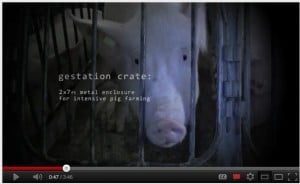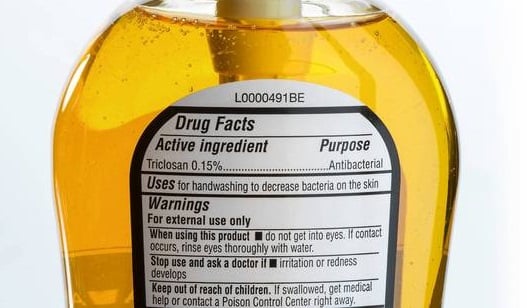
McDonald’s Corporation and Hormel both recently announced that they will phase out the use of sow gestation stalls in favor of more humane treatment of pigs that become our food.
A gestation create is a 2 x 7 crate in which a pig lives its entire live, virtually immobalized and unable to even turn around. impregnated over and over and over. A recent undercover investigation by The Humane Society of the United States (HSUS) offered an inside look Seaboard Foods and Prestage Farms; Seaboard is the nation’s third-largest pork producer, and a supplier to Walmart. Prestage is the nation’s fifth-largest pork producer.
A HSUS press release explains:
In addition to the extreme confinement endured by animals at both facilities, the investigations found workers cutting piglets’ testicles and tails off with no painkiller, injured piglets with their legs duct-taped to their bodies, gestation crates overflowing with feces and urine, and employees hitting pigs’ genitals to force them to move from one crate to another.
Because the abuse documented at the Seaboard facility is in stark contrast to statements on the company’s website about animal care – which read, in part, “daily animal handling plant audits and employee training ensure proper animal treatment” – The HSUS filed legal complaints against the company with the SEC and FTC urging the agencies to require that Seaboard stop misleading its shareholders and the public.
I’ve talked to people recently who don’t have a problem with gestation crates – for pigs or for commercial dog breeding. I suspect, however, that those people don’t actually know what a gestation crate is or how the pig (or dog) is treated. After watching the video above, if those people still want to argue gestation crates are humane, that’s fine. They’re entitled to their opinions. As long as they really understand what they’re arguing for.
In America, we’ve become distanced from our food. For most of us, when you think “bacon” you think of the wrapped package in the grocery refrigerator section. We don’t think about the pig that was actually killed – How was it raised? What did it eat? How was it killed? How does that affect the quality of life for the animal? And how does that affect the quality of the food I’m about to put into my mouth?
We are what we eat – and we are what what we eat, eats. Just because I’m a consumer in a free country, does that mean I shouldn’t consider the moral implications of the animals I eat? That I shouldn’t say “no” to something I might want because having it causes pain and suffering to an animal? And shouldn’t I be concerned about the health of the animals I eat, and how their health affects my health? What role does my religious faith play in how I treat the animals I eat?
It’s not a coincidence that as Americans have become larger and larger consumers of factory farmed meats that we’ve also seen a rise in health problems like cancer, heart disease and diabetes.
If you’re interested in learning more about animals and food, consider checking out Michael Pollen’s thoughtful and well-balanced book, “The Omnivore’s Dilemma: A Natural History of Four Meals” or watching the documentary, “Food, Inc.”
I’m not advocating for vegetarianism; I eat meat. But being more aware of what we eat can lead to a healthier lifestyle for us – and our animal friends.











